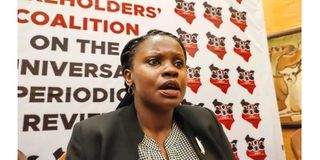Activists decry 'super-slow' pace of enforcing women rights policies

African Gender and Media Initiative Trust executive director Gladys Kiio.
What you need to know:
- They spoke at the launch of Human Rights Scorecard at a Nairobi hotel
- African Gender and Media Initiative executive director Gladys Kiio cited a huge gap in the enforcement of policies.
Kenya is “super slow” in its implementation of policies on women’s rights, human rights activists have said.
Speaking at the launch of Human Rights Scorecard at a Nairobi hotel, African Gender and Media Initiative executive director Gladys Kiio cited a huge gap in the enforcement drive.
“There is a lot of work to be done by the government, civil society and development partners to ensure effective implementation of policies… but the burden of responsibility falls with the government,” she said.
The event was organised by the Kenya Stakeholders Coalition on the Universal Periodic Review (UPR).
10-year outcome
The report reviewed the country’s performance in the past 10 years in terms of actions taken to improve human rights situations.
Kenya, as a member of the United Nations, is obligated to conduct a UPR, a unique mechanism of the Human Rights Council done every five years, to assess and track its human rights outcomes.
There are 30 basic human rights, according to the UN. They include the right that “no one can take away your human rights.”
Ms Kiio challenged civil society to continue pushing the government to fast-track enforcement of policies on ending gender-based violence (GBV).
“Much as we implement the policies, we need to look at the conversations we are having with the communities; are they are going to ultimately help us address the drivers of GBV?” she asked.
Talk It founder Joseph Njoroge noted the establishment of Ngara child-friendly clinic by the Nairobi Metropolitan Services as a commendable progress in addressing mental issues among the adolescents.
Mental health
Talk It is a community-based organisation creating awareness of mental health among residents of Nairobi and Kiambu counties.
Mr Njoroge said girls are more prone to depression due to teenage pregnancies and forced marriages.
Mr Gilbert Onyango, executive director of UPR Africa, a non-governmental organisation that supports civil society in Africa to participate in UPR, said to become “a truly human rights respected state, it is important for all Kenyan citizens to play a role however small, to promote a human rights culture.”
“We all have a responsibility to hold the government accountable in actions it is taking to protect our rights.”





